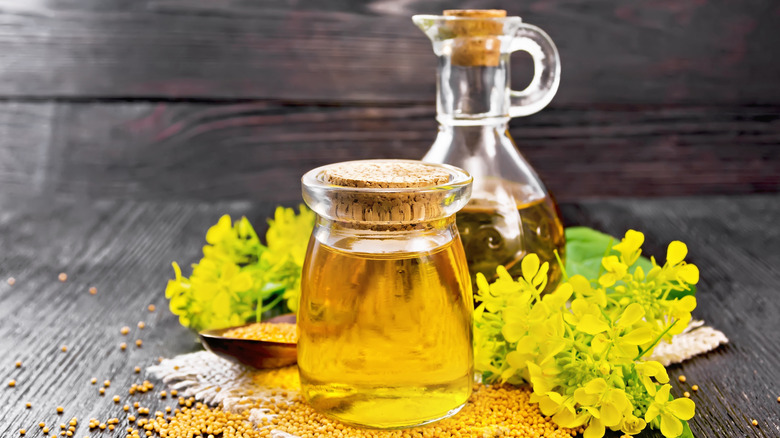The Reason Mustard Oil Is Banned In The United States
Frying and sautéing proteins and vegetables in mustard oil gives them a pronounced peppery flavor in many cuisines throughout Asia. In India, it's also a classic choice for pickling fruits and veggies. But in the United States, the traditional version of this spicy oil made from mustard seeds has been banned for use in cooking. The Food and Drug Administration (FDA) cited that some studies revealed test animals suffered from cardiac lesions and nutritional deficiencies as a result of consuming expressed mustard oil.
The potential culprit behind the issues related to consuming mustard oil is erucic acid. This monounsaturated fatty acid can be found in mustard seeds and the seeds of cabbage, kale, and rapeseed. In fact, canola oil was born as a direct result of concerns about unsafe levels of erucic acid in the rapeseed plant. This led to breeding practices that created a version of the plant that contained significantly less erucic acid — this canola oil from its processed seeds is what's sold on the market today.
Limited studies have been pointed to as causal evidence that the high levels of erucic acid in mustard oil are to blame for incidences of myocardial lipidosis (a degenerative heart condition) in rodents that were tested (per Hong Kong's Centre for Food Safety). However, few studies involving the effect of erucic acid have been done on humans, so some are skeptical about the need for the oil to be banned.
Benefits of mustard oil
The United States isn't the only country concerned about mustard oil and its effects on human health. Australia, New Zealand, and all 27 countries in the European Union have recommended limits for consumption. However, advocates for the availability of mustard oil point to its widespread usage in a number of countries as a testament to the fact that it isn't dangerous. In fact, the Lipid Association of India (LAI) suggests that it's a heart-healthy oil to use.
In terms of health benefits, one study published in Cancer Letters noted a marked reduction in colon cancer tumors when administered to rats. The compound allyl isothiocyanate, which is naturally-occurring in mustard seeds, was reported to be useful in fighting against bladder cancer, as reported by Carcinogenesis. Additionally, according to MedicineNet, consuming mustard oil may help fight inflammation, reduce cholesterol, ward off colds, and help with weight loss.
MedicineNet also suggests combining it with turmeric and salt for a paste to apply to teeth which may help improve dental issues. Mustard oil can also be used on skin and hair to improve their appearance or used for massages, though you'll want to check first to make sure you're not allergic. Also, if you're looking for an insect repellant for your garden, it can do that, too.
What to do if you want to cook with mustard oil in the U.S.
If you've weighed the risks and benefits of consuming mustard oil and have decided the spicy condiment is one that you want in your kitchen cabinet, there are a few solutions. While the FDA warns against consuming it, there are versions on the market that some home cooks can use in the kitchen, though you may encounter mixed results among brands.
It's usually pretty easy to find a vegetable oil substitute when you don't have your preferred variety on hand, but it would be a challenge to find one that matches the unique flavor of mustard oil. However, there is one option that is similar to classic mustard oil. Yandilla is one FDA-approved brand that is made in Australia but available in the United States.
Using the technique with which canola oil was invented, Yandilla is produced using seeds from a mustard plant bred to contain less erucic acid. In appearance, the oil is not exactly the same, with a paler hue and a thinner consistency, but it matches the original in its spicy flavor which is akin to horseradish or wasabi. Once you get your hands on a bottle, you'll be well on your way to making a condiment like Indian pickles, using it to amp up your grilled veggie recipes, or taking any protein to the next level.



